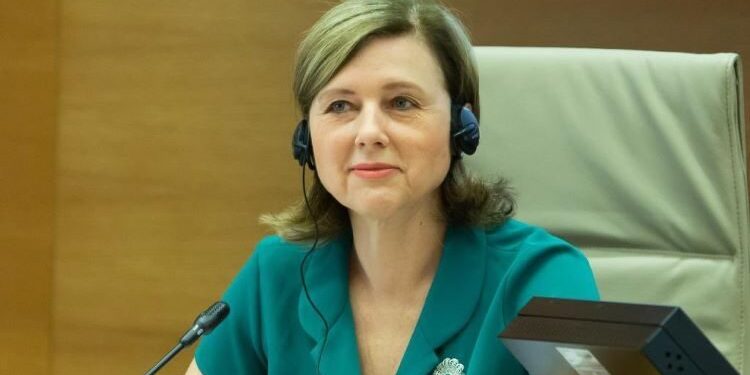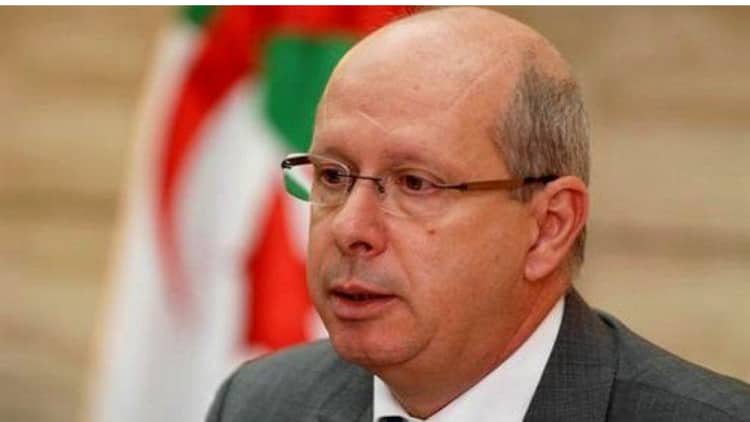The Diplomat
The Vice President and Commissioner for Values and Transparency of the European Commission, Vera Jourová, warned yesterday in Madrid that Spain must renew “as soon as possible” the General Council of the Judiciary (CGPJ) and asked that the members of this body be appointed by “the judges themselves and not the parties” to avoid its politicization.
Jourová has been in Madrid since Monday to meet with government officials and the judiciary, as part of a three-day visit to Spain to prepare the Commission’s annual assessment of the democratic health of the 27 Member States, to be published next July. In the previous report, published in the summer of 2021, Brussels lamented the delays in the renewal of the General Council of the Judiciary, which has remained blocked since December 2018 due to the lack of agreement between the PP and the PSOE.
The European Commissioner – whose visit began on Monday with a meeting with the Minister of Foreign Affairs, José Manuel Albares, and with the Ombudsman, Ángel Gabilondo – was received yesterday in Madrid by the Minister of the Presidency, Félix Bolaños, who agreed with Jourová “on the urgency of renewing the CGPJ, which has been in office for three and a half years”, and informed the Vice-President “of the efforts that the Spanish Government has been making during all this time to renew the governing body of the judges”, according to a press release from the Ministry. The minister reiterated “the Government’s willingness to renew as soon as possible both the CGPJ and the Constitutional Court and its will to reach an agreement,” the same source added. “I thanked the Minister of the Presidency for Spain’s support in the preparation of the upcoming Rule of Law Report 2022 and reiterated my concern about the lack of renewal of the Council of the Judiciary,” the European official said via Twitter.
Vera Jourová was also received by the Minister of Justice, Pilar Llop, with whom she addressed, among other issues, the renewal of the General Council of the Judiciary. On this last issue, according to the Ministry, Llop insisted on the need to renew the governing body of judges because “the main opposition party must comply with the Constitution”.
“A stable and election-proof system”
The European vice-president also participated yesterday in an informative meeting organized by New Economy Forum in Madrid, in which she was asked if Spain could be sanctioned in case the blockage to the renewal of the General Council of the Judiciary is maintained. “According to the rules”, the members of the Council “have to be composed of a part of judges elected by judges, who should be the majority”, compared to a minority of members who “should be appointed by the Parliament, by the political parties”, she explained. “If Spain complies with that rule, there will be no problems,” she added. In both the first evaluation report of September 2020 and the second, of July 2021, the Commission called for a “structural reform” of the CGPJ election system so that at least 50% of the members are appointed by the judges themselves, and not by the Parliament (as has been the case until now), “in line with European standards”.
Regarding the negotiations with the PP to move forward with the renewal of the CGPJ, the Vice-President admitted “that it is not easy, and I understand well what the political reality in Spain is, and that many political efforts are being made”, but “I would like to see results” that allow to put in place “a stable system, which can survive future elections”. “The system has to be stable in the long term and has to be resilient against political pressures after elections”, because “after elections, sometimes, those who have won believe that they have the mandate to influence the Judiciary, and it is a mistake”.
Vera Jourová also spoke yesterday before the Justice Commission of the Congress, where she expressed her wish that her presence in Spain would help to unblock the renewal of the CGPJ and that the parties involved would reach a consensus on a proposal that “manages to survive future elections” and lead to a judiciary “as neutral and independent as possible”. Therefore, the vice president reiterated that the members of the Council should be elected by “the judges themselves and not by the parties”, so that “the judiciary is not politicized and does not have that vulnerability”.
“In the 2021 report, the Commission reiterated its concern about the fact that the CGPJ had not been renewed” and in Brussels the “concern” for this same reason continues today, continued Jourová, without wishing to enter into the “political debate” (“almost fight”, in her words) that exists in Spain on this issue. In any case, she warned, this issue will figure again in next July’s report. “This question of appointments must be solved as soon as possible,” she said. “We have a great concern regarding the CGPJ in Spain and we want this situation to be unblocked,” she added.







